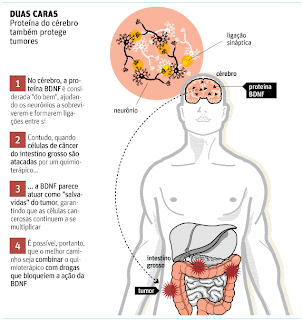É um caso clássico de dupla personalidade molecular que começa a ser revelado: a proteína que, no cérebro, favorece a formação de memórias, enquanto parece proteger tumores do intestino.
Trata-se da BDNF, cuja ação pode trazer pistas para novas formas de atacar o câncer.
Estudando células tumorais em laboratório, pesquisadores da UFRGS (Universidade Federal do Rio Grande do Sul) demonstraram que a proteína neutraliza os efeitos de uma droga anticâncer.
Se a descoberta se confirmar, é possível que o tratamento adequado contra a doença exija tanto um ataque convencional ao tumor quanto um bloqueio desse mecanismo de compensação.
CARICATURA
Segundo Rafael Roesler, um dos autores do estudo, a BDNF não é exatamente uma exceção. Há diversos indícios de que há semelhanças entre certos processos do sistema nervoso e o que acontece no interior dos tumores.
"Existem vários paralelos entre a plasticidade sináptica [a maleabilidade das ligações entre neurônios], a formação de memórias e a proliferação de células tumorais", diz ele. É possível que o câncer "sequestre e reproduza, de forma caricata, o que ocorre nos neurônios".
Tanto é assim que o gene do receptor (a "fechadura química") ao qual a BDNF se conecta foi estudado primeiro como gene associado ao câncer, e só mais tarde teve sua função nos neurônios elucidada, conta Roesler.
NO HOSPITAL
No estudo, Roesler e seus colegas Caroline Brunetto de Farias (cujo doutorado versa sobre o tema) e Gilberto Schwartsmann avaliaram a atividade da proteína em tumores do intestino grosso de 30 pacientes de Porto Alegre, homens e mulheres com idade média acima dos 60 anos.
O crucial aqui é que, junto com o tecido canceroso, eles obtiveram também tecido saudável dessas pessoas, o que permitia comparar as diferenças moleculares entre as duas condições.
Em quase todas as amostras de câncer, o gene responsável pela produção da BDNF estava ativado, e de forma bem mais acentuada do que nos tecido normais. Veio então a aplicação de um quimioterápico experimental contra as células tumorais.
Essa substância é capaz de diminuir a proliferação das células de câncer. Mas, quando era aplicada, a produção de BDNF crescia, aparentemente para proteger as células tumorais atacadas. E uma dose extra da proteína acabava com o efeito da droga.
O próximo passo dos pesquisadores é verificar se o processo se repete, por exemplo, em animais de laboratório com câncer. Também seria preciso ver se há formas de bloquear a ação da BDNF sem afetar os neurônios, talvez com substâncias que façam esse serviço sem passar do sangue para o cérebro.
A pesquisa está na revista científica "Oncology". A equipe integra o Instituto Nacional de Ciência e Tecnologia Translacional em Medicina, cujo objetivo é transformar conhecimento científico em novas opções para o tratamento de pacientes.
It's a classic case of split personality molecular begins to be revealed: the protein in the brain favors the formation of memories, while it seems to protect intestinal tumors.
This is the BDNF, whose action can yield clues to new ways to attack cancer.
Studying tumor cells in the laboratory, researchers at UFRGS (Federal University of Rio Grande do Sul) demonstrated that the protein neutralizes the effects of an anticancer drug.
If the discovery is confirmed, it is possible that the proper treatment against the disease requires both a conventional attack by blocking this tumor as a compensation mechanism.
CARICATURE
According to Rafael Roesler, one of the authors of the study, BDNF is not exactly an exception. There are several indications that there are similarities between certain processes of the nervous system and what happens inside the tumors.
"There are many parallels between synaptic plasticity [the malleability of connections between neurons], memory formation and proliferation of tumor cells," he says. It is possible that cancer "kidnap and play, so ridiculous, which occurs in neurons."
So much so that the receptor gene (the "chemical lock") which connects the BDNF was studied as the first gene linked to cancer, and only later played a role in neuronal elucidated, says Roesler.
IN HOSPITAL
In the study, Roesler and his colleagues Caroline Brunetto de Farias (whose doctorate is about the theme) and Gilberto Schwartsmann assessed the activity of the protein in tumors of the large intestine of 30 patients from Porto Alegre, men and women with average age over 60 years.
The key here is that, along with the cancerous tissue, they also had these people healthy tissue, which allowed to compare the molecular differences between the two conditions.
In almost all cancer samples, the gene responsible for production of BDNF was activated, and so much more marked than in normal tissue. Then came the application of an experimental chemotherapy against tumor cells.
This substance is able to reduce the proliferation of cancer cells. But when it was applied, the increased production of BDNF, apparently to protect tumor cells attacked. And an extra dose of the protein ended up with the drug.
The next step for researchers is whether the process is repeated, for example, in laboratory animals with cancer. It would also need to see if there are ways to block the action of BDNF without affecting the neurons, perhaps with substances that make this service without going through the blood to the brain.
The research is in the journal Oncology. The team is part of the National Institute of Science and Technology in Translational Medicine, which aims to transform scientific knowledge into new options for treating patients.


Nenhum comentário:
Postar um comentário